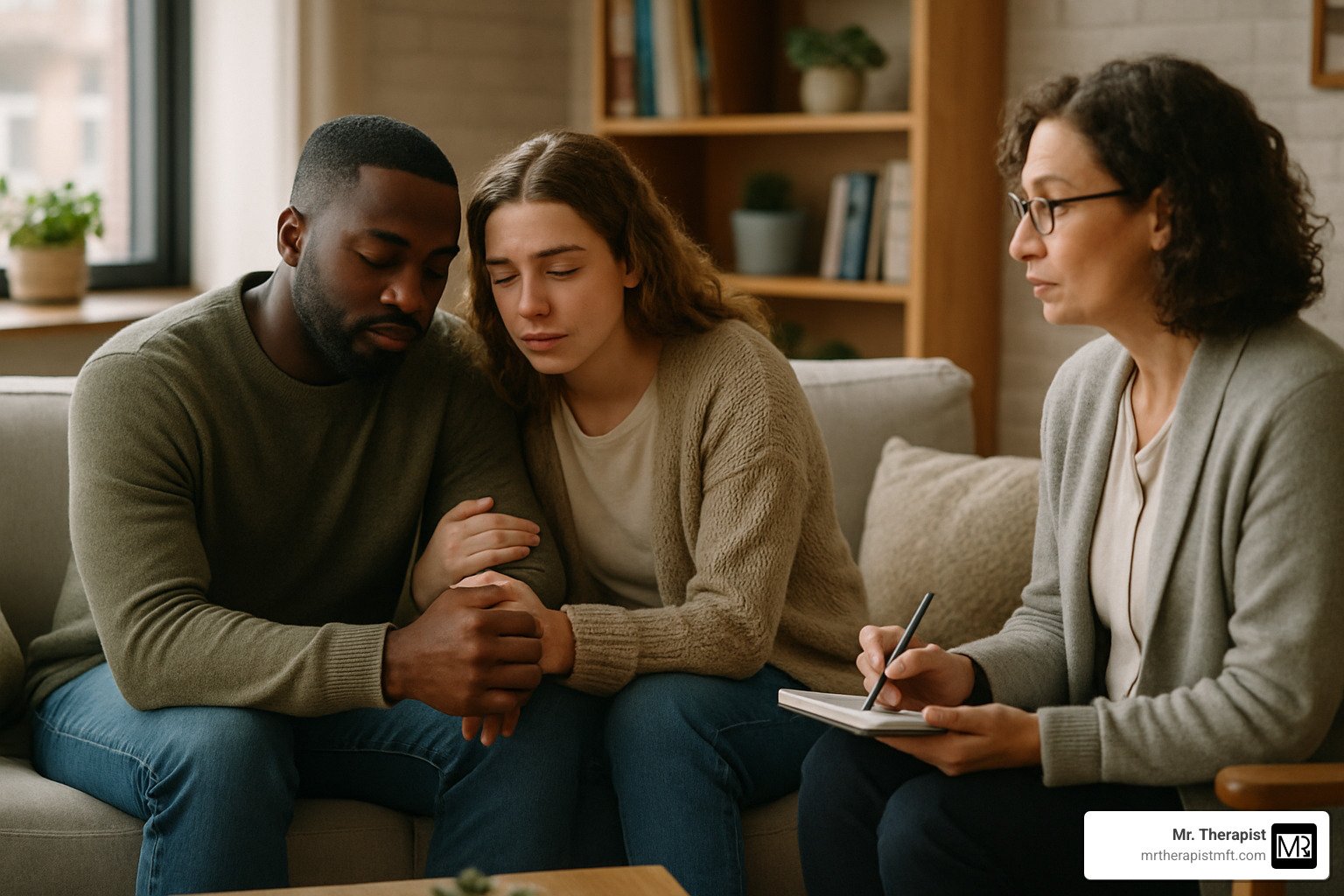
Relationship Counseling offers a lifeline for those feeling overwhelmed by relationship challenges. If you’re looking for help, here’s a quick answer:
- Strengthens Communication: Coaching for better dialogue between partners.
- Resolves Conflicts: Tools and strategies for managing disagreements.
- Builds Emotional Resilience: Techniques to improve personal emotional strength.
Relationship challenges can feel daunting, but you’re not alone. The stresses of daily life can make even the strongest relationships wobble. Problems like unproductive arguments or differing life goals often test emotional resilience. This is where Relationship Counseling steps in to help steer the storm.
My name is Emmanuel Romero, a Licensed Marriage & Family Therapist. With years of experience in helping couples and individuals, I focus on using effective methods, like Emotion-Focused Therapy, to improve your relationship and emotional resilience.

Similar topics to Relationship Counseling:
Understanding Relationship Counseling
Relationship Counseling is a specialized form of psychotherapy designed to help couples improve their communication, resolve conflicts, and strengthen their emotional bonds. This type of counseling is essential for partners who are struggling to maintain a healthy relationship due to various challenges.
Psychotherapy in Relationship Counseling
Psychotherapy serves as the backbone of Relationship Counseling. It provides a safe space for couples to explore and understand the underlying issues affecting their relationship. By working with a therapist, couples can uncover deep-seated emotional patterns and learn how to address them constructively.
Improving Communication
Effective communication is key to any successful relationship. Many couples face difficulties in expressing their needs or emotions, which can lead to misunderstandings and resentment. Relationship Counseling focuses on enhancing communication skills by teaching partners how to listen actively and express themselves without blame or criticism.
-
Active Listening: This technique encourages partners to fully concentrate on what the other is saying without interrupting. It helps in understanding each other’s perspectives better.
-
Non-Defensive Communication: Couples learn to express their feelings and needs without putting the other person on the defensive. This involves using “I” statements instead of “You” statements, which can often feel accusatory.
Conflict Resolution
Conflicts are inevitable in any relationship, but how they are managed can make or break a partnership. Relationship Counseling equips couples with tools and strategies to handle disagreements constructively.
-
Identifying Patterns: Often, couples fall into repetitive conflict patterns that are hard to break. A therapist can help identify these patterns and suggest ways to alter them.
-
Problem-Solving Skills: Couples learn how to approach conflicts with a problem-solving mindset, focusing on finding mutually beneficial solutions rather than winning an argument.
By addressing these core areas, Relationship Counseling aims to foster a healthier, more fulfilling partnership. Whether you’re facing minor disagreements or significant challenges, this form of therapy can provide the guidance and support you need to steer your relationship journey.
When to Seek Relationship Counseling
Knowing when to seek Relationship Counseling can make a significant difference in the health of your relationship. Many people believe that therapy is only for couples on the brink of separation, but early intervention can prevent issues from escalating.
Early Intervention
The average couple waits six years before seeking therapy. That’s a long time for problems to fester and grow. Early intervention is crucial for addressing issues before they become unmanageable. If you notice that disagreements are affecting your daily life, that’s a sign to consider counseling.
-
Trouble Expressing Feelings: If you or your partner struggle to express emotions, it might lead to misunderstandings. Therapy can help both partners learn how to communicate more effectively.
-
Decision-Making Difficulties: Couples often face challenges when making joint decisions. A therapist can guide you in finding common ground and improving decision-making processes.
Unsolvable Disagreements
Every couple has disagreements, but some issues seem impossible to resolve. These “unsolvable disagreements” can be about anything from finances to family responsibilities.
-
Frequent, Unproductive Arguments: If you find yourselves stuck in a cycle of repetitive, hurtful arguments, it’s time to seek help. Therapy can teach you how to discuss issues without escalating into fights.
-
Withdrawal or Criticism: Negative interaction patterns, like withdrawing from conversations or being overly critical, can damage a relationship. A therapist can help break these patterns and foster more positive interactions.
Infidelity
Infidelity is a significant breach of trust, but it doesn’t have to mean the end of a relationship. About a third of married couples survive an affair when they seek counseling and commit to rebuilding their relationship.
-
Emotional Betrayal: Infidelity isn’t just physical. Emotional betrayal, like reconnecting with an old flame secretly, can be just as damaging. Therapy helps partners define what fidelity means to them and rebuild trust.
-
Rebuilding Trust: A therapist can guide couples through the complex process of regaining trust. This involves open communication, honesty, and a willingness to understand each other’s perspectives.
In summary, Relationship Counseling is not just for couples in crisis. It’s a proactive step that can strengthen your relationship, improve communication, and resolve conflicts before they become impossible. Whether you’re dealing with early signs of trouble or more serious challenges like infidelity, counseling offers a path to a healthier partnership.
Next, we’ll explore the different types of Relationship Counseling available to suit your specific needs and circumstances.
Types of Relationship Counseling
When considering Relationship Counseling, it’s important to understand the different approaches available. Each type offers unique benefits, depending on your needs and situation. Let’s explore three popular forms: emotion-focused therapy, premarital counseling, and online therapy.
Emotion-Focused Therapy (EFT)
Emotion-Focused Therapy is grounded in attachment theory. It aims to create a secure emotional bond between partners. This approach is ideal for couples who feel disconnected or struggle with expressing emotions.
-
Building Emotional Bonds: EFT helps partners understand and respond to each other’s emotional needs. This can lead to stronger, more resilient relationships.
-
Resolving Conflicts: By focusing on emotions rather than just behaviors, EFT addresses the root causes of conflicts. This can lead to more lasting resolutions.
-
Proven Effectiveness: Studies show that EFT has a high success rate in improving relationship satisfaction. It’s a well-researched method used by many therapists.
Premarital Counseling
Premarital counseling prepares couples for marriage by addressing potential issues before they arise. It’s beneficial for those about to enter a long-term commitment.
-
Communication Skills: Couples learn how to communicate effectively, which is crucial for a healthy marriage.
-
Setting Expectations: Discussing topics like finances, family planning, and roles can help set realistic expectations.
-
Building a Strong Foundation: Premarital counseling helps couples start their marriage on solid ground, reducing the likelihood of future conflicts.
Online Therapy
Online therapy offers a convenient alternative to in-person sessions. It’s perfect for couples with busy schedules or those in long-distance relationships.
-
Flexibility: Online sessions can be scheduled around your availability, making it easier to commit to regular therapy.
-
Comfort and Accessibility: Some people find it easier to open up in a familiar environment. Online therapy can be less intimidating than face-to-face sessions.
-
Effective Solutions: Online therapy uses video calls, chats, and other digital tools to facilitate communication and problem-solving.
By understanding these different types of Relationship Counseling, you can choose the approach that best suits your needs. Whether you’re looking to strengthen emotional bonds, prepare for marriage, or find a flexible therapy option, there’s a method that can help you achieve your relationship goals.
Next, we’ll discuss how to find a qualified relationship therapist to guide you on this journey.
How to Find a Qualified Relationship Therapist
Finding the right Relationship Counseling professional can feel daunting, but it’s crucial for effective therapy. Here’s a step-by-step guide to help you find a qualified therapist who meets your needs.
Identify Licensed Professionals
Start by looking for licensed professionals. These include clinical psychologists, licensed counselors, registered marriage and family therapists, and licensed clinical social workers. Each of these professionals brings different expertise, but all are trained to provide effective relationship counseling.
Here’s a quick breakdown of what each type can offer:
- Clinical Psychologists: Specialize in diagnosing and treating mental health issues, which can be beneficial if your relationship struggles involve mental health challenges.
- Licensed Counselors: Focus on providing guidance and support for emotional and psychological issues, often with a more general approach.
- Marriage and Family Therapists: Specialize in relationship dynamics and family systems, making them ideal for couples and family counseling.
- Licensed Clinical Social Workers: Offer therapy and also help with broader social issues that might impact relationships.
Consider the Therapist-Client Relationship
The relationship between you and your therapist is key. A good therapist will make you feel comfortable, understood, and supported. Many therapists offer a free initial consultation. Use this opportunity to gauge your comfort level with the therapist and discuss their approach to counseling.
Questions to Ask During the Consultation:
- What is your experience with relationship counseling?
- Which therapeutic methods do you use?
- How do you handle conflicts during sessions?
Use Online Directories
If personal recommendations aren’t available, online directories are a great resource. Websites dedicated to mental health services often have search options to find licensed therapists in your area. These platforms allow you to filter therapists by specialty, location, and even insurance coverage.
For those in San Clemente, CA, or anywhere else in California, local directories can help you find professionals nearby. Additionally, if you prefer online therapy, many directories list therapists who offer virtual sessions, providing flexibility and convenience.
Explore Online Relationship Counseling
Online counseling is an excellent option if you have a busy schedule or prefer the comfort of your own home. It allows you and your partner to connect with a therapist via video calls, chats, or phone sessions. This can be especially useful if you and your partner live in different locations or travel frequently.
Benefits of Online Counseling:
- Accessibility: Attend sessions from anywhere, eliminating commute time.
- Comfort: Some people find it easier to discuss sensitive topics in a familiar setting.
- Flexibility: Schedule sessions around your availability.
By following these steps, you’ll be well on your way to finding a qualified relationship therapist who can guide you through the challenges you face. The right therapist can make a significant difference in your journey towards a healthier, happier relationship.
Next, we’ll explore how to make the most out of your Relationship Counseling sessions.
Making Relationship Counseling Effective
To get the most from Relationship Counseling, you and your partner must be proactive participants. Here are three key elements to ensure your sessions are as effective as possible: honesty, active listening, and a commitment to change.
Honesty
Honesty is the foundation of successful counseling. Being truthful with your therapist—and with each other—is crucial. Sometimes, people hold back because they fear judgment or conflict. Your therapist is there to help, not judge.
Why Honesty Matters:
- Builds Trust: Openness fosters trust between you and your partner.
- Identifies Issues: Honest conversations help uncover the root causes of problems.
- Facilitates Growth: Truthful discussions pave the way for real change.
Active Listening
Active listening means truly hearing and understanding your partner’s words. It’s more than just nodding along; it’s about engaging with what they say. This technique is powerful in reducing misunderstandings and conflicts.
How to Practice Active Listening:
- Give Full Attention: Put away distractions like phones or TV.
- Reflect Back: Repeat what your partner says in your own words to confirm understanding.
- Ask Questions: Show interest by asking clarifying questions.
Therapists often use active listening exercises in sessions. This approach helps break down barriers and encourages empathy.
“There’s something powerful about being heard,” says Tracy Ross, a couples and family therapist.
Commitment to Change
Both partners must be committed to making changes for therapy to work. This means being open to new ideas and willing to adjust behaviors that harm the relationship.
Steps to Foster Commitment:
- Set Goals: Identify what you want to achieve in counseling.
- Stay Open-Minded: Be willing to try new strategies suggested by your therapist.
- Be Patient: Understand that change takes time and effort.
A commitment to change doesn’t mean everything will be perfect immediately. It’s about making consistent efforts towards improvement.
By embracing honesty, practicing active listening, and committing to change, you’ll maximize the benefits of Relationship Counseling. These elements create a supportive environment where both partners can work towards a healthier, more fulfilling relationship.
In the next section, we’ll address common questions about Relationship Counseling, like its effectiveness and who can benefit from it.
Frequently Asked Questions about Relationship Counseling
Is online relationship counseling effective?
Yes, online Relationship Counseling can be very effective. It offers flexibility and accessibility, which is especially helpful for couples in long-distance relationships or those with busy schedules.
Benefits of Online Counseling:
- Convenience: Attend sessions from the comfort of your home.
- Flexibility: Easier to fit into varied schedules.
- Comfort: Some find it less intimidating than face-to-face meetings.
Research shows that online therapy can be just as effective as in-person sessions for many couples. It uses tools like video calls and chat to facilitate communication and problem-solving.
Who should seek relationship counseling?
Relationship Counseling isn’t just for couples on the verge of breaking up. It can benefit anyone who wants to improve their relationship, whether you’re dating, married, or in any form of partnership.
Signs You Might Benefit from Counseling:
- Difficulty expressing feelings
- Frequent arguments or unsolvable disagreements
- Experiencing infidelity, addiction, or abuse
- Facing major life changes or stress
Even happy couples use counseling to strengthen their bond and communication skills. It’s about enhancing what works and addressing what doesn’t.
What are common issues addressed in relationship counseling?
Relationship Counseling covers a wide range of topics. Here are some common issues couples explore:
- Communication Problems: Learning to express thoughts and feelings clearly.
- Conflict Resolution: Developing strategies to handle disagreements constructively.
- Intimacy and Affection: Addressing sexual and emotional intimacy issues.
- Financial Concerns: Navigating money-related stress and decision-making.
- Parenting and Family Dynamics: Aligning on parenting styles and family roles.
These sessions provide a safe space to tackle sensitive topics with the guidance of a trained therapist. Often, the focus is on identifying and changing negative patterns that harm the relationship.

With the right approach, Relationship Counseling can transform how partners connect and grow together.
In the following section, we’ll wrap up with some final thoughts and insights from Mr. Therapist on achieving emotional healing and fostering healthy relationships.
Conclusion
At Mr. Therapist, we believe that Relationship Counseling is a powerful tool for emotional healing and building healthy relationships. Founded by Manny Romero, our practice in California specializes in Emotion-Focused Therapy, helping clients harness their emotions as a pathway to healing and growth.
Why Choose Mr. Therapist?
-
Expertise in Emotion-Focused Therapy: Our approach is grounded in evidence-based methods that have proven effective in improving communication and emotional resilience.
-
Customized Care: We tailor our therapy sessions to meet the unique needs of each couple, ensuring that you receive the most relevant and effective support.
-
Flexible Options: With both in-person and online sessions available, we make it easy for you to access therapy in a way that fits your lifestyle.
Emotional Healing and Healthy Relationships
Our goal is to guide couples through the complexities of their relationships, helping them to:
-
Understand and Express Emotions: We teach clients how to identify and articulate their feelings, paving the way for deeper connections.
-
Resolve Conflicts Constructively: By developing conflict resolution skills, couples learn to handle disagreements in a healthy and respectful manner.
-
Strengthen Bonds: Through therapy, couples can rebuild trust and intimacy, creating a stronger foundation for their relationship.
At Mr. Therapist, we are committed to supporting you on your journey to a more fulfilling and harmonious partnership. Whether you’re facing challenges or simply want to improve your relationship, our team is here to help you every step of the way.
Take the Next Step
If you’re ready to transform your relationship, contact us today for a free consultation. Let us help you build the emotional resilience and healthy relationship you deserve.
With the right support and commitment, Relationship Counseling can lead to profound changes in how you and your partner connect and grow together. At Mr. Therapist, we’re here to guide you towards a brighter, more connected future.



